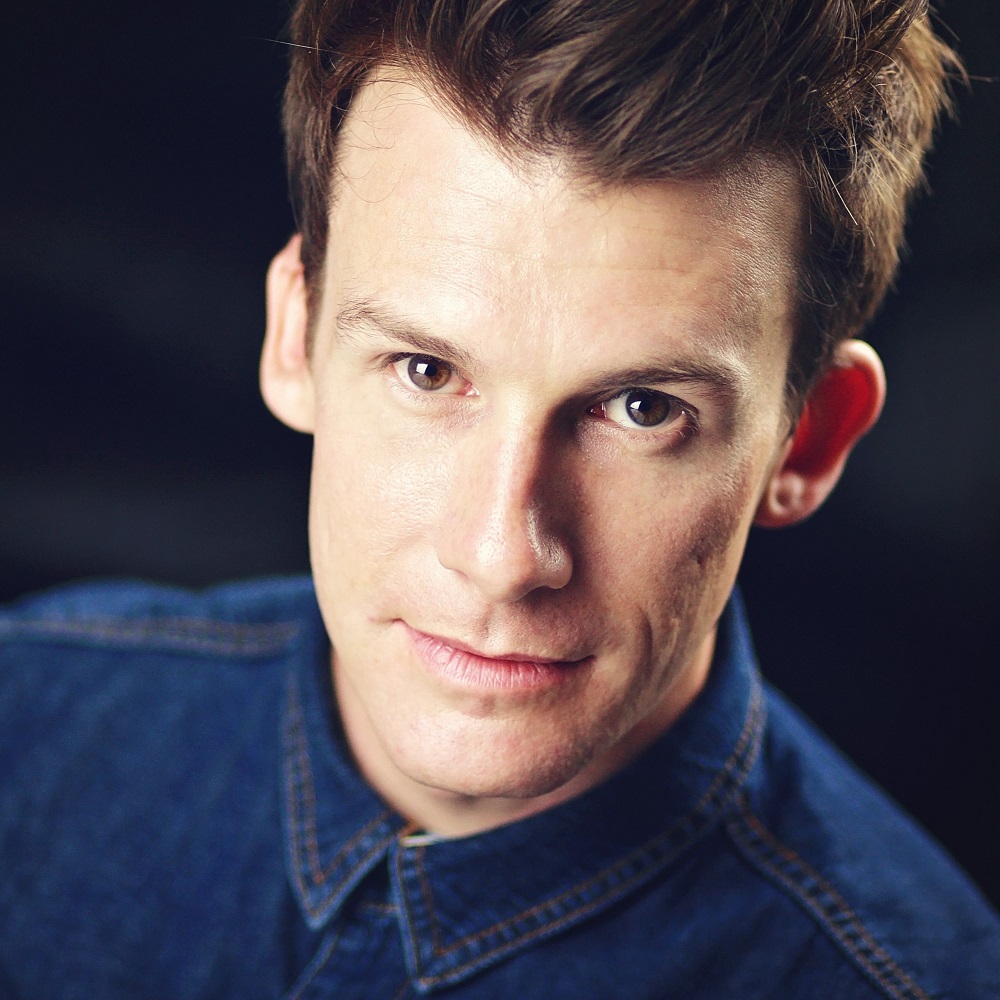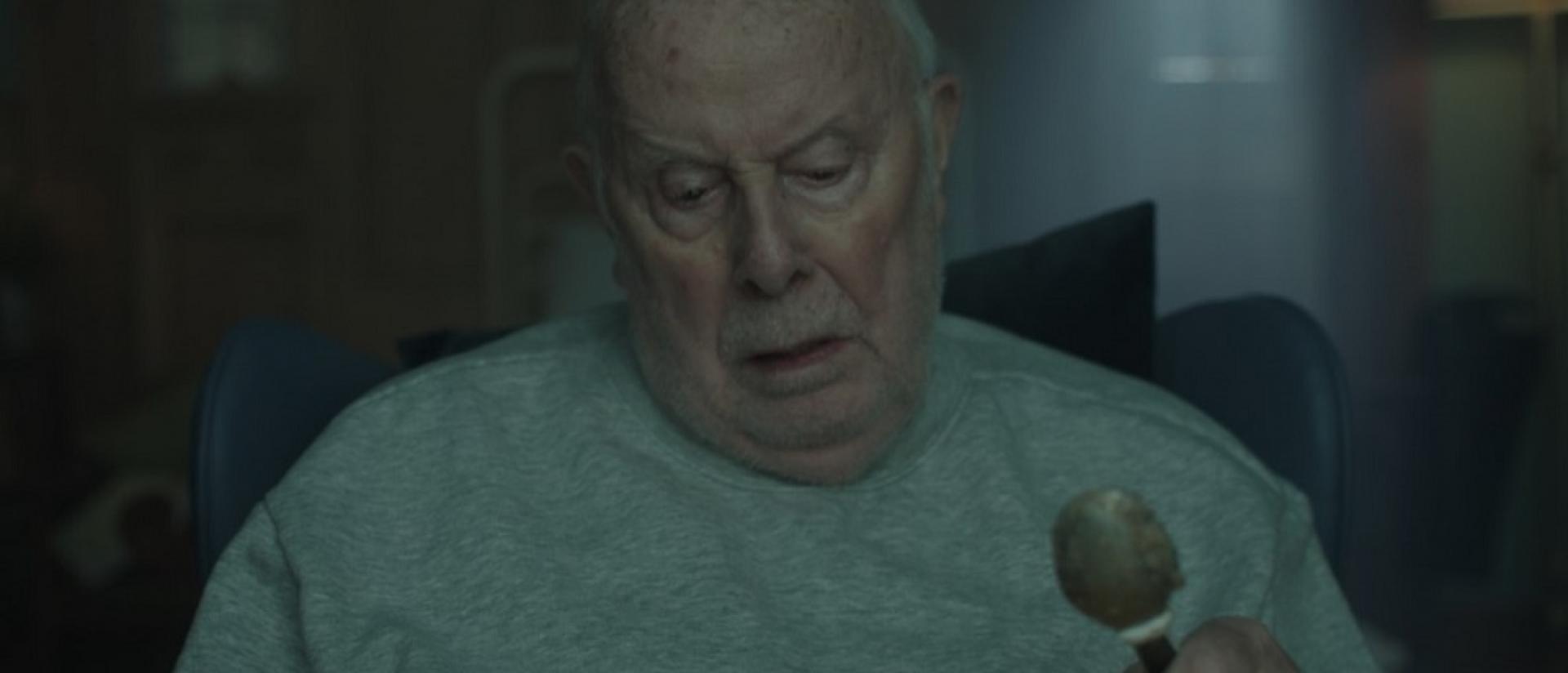Meet the Beacons makers: Peter Darney
To celebrate the latest BBC broadcast of short films made through our Beacons scheme, Ffilm Cymru Wales are sharing interviews introducing the new and emerging Welsh filmmakers that made them.
In Peter Darney’s drama G♭, following a debilitating stroke, 84-year-old cellist Ceri seizes the opportunity that a carer shortage brings to use a dating app and invite sex worker Iestyn for a visit.
Before the broadcast, we caught up with Peter to discuss festival experiences, inspirations and intersectional representation on screen.
Hi Peter, can you tell us a little bit about yourself?
I am a writer / director originally from Neath, now living in Cardiff. I trained first as an actor at RWCMD, and then as a theatre director, so you could say I’ve worked my way through a lot of jobs in the industry before committing to my true vocation!
What inspired you to make G♭?
G♭ is about queer intimacy, consent, and having autonomy over your body. Discussions around consent have moved on in such an amazing way, particularly in the queer community, and it’s been fantastic to see. But I was really interested in the fact that, as you get older, you actually lose many of those rights. I saw this with my grandmother, who, toward the end of her life had a string of anonymous carers providing intimate care with as much compassion as their limited time allowed. And also that - at the moment when you may deem your life to have become unliveable - you may no longer have the ability to end it, and so be kept alive in a non-consensual way. I was interested in the fact that - whilst you might assume the opposite - that the sex worker better understands consent and autonomy over the body than the carer. That they might offer quality intimacy (not just in physical terms) where the carer can’t.
How did you approach sensitively representing the intersections of sexuality, old age, disability and sex work?
I think so much is about having open conversations through the casting process to make sure that everyone is comfortable with the material and are willing contributors to the story I set out to tell. Richard Wilson was in my head to play Ceri from the outset (I don’t know what I would have done if he had said ‘no’) and we had several conversations about the character and the relationships in the film before he (thankfully) said yes. It was important to me as a Queer Filmmaker to cast LGBTQ+ actors in the queer roles, and Nicola (our casting director) was great about that. The characters in my film are making decisions from a considered and informed place. There was never any need for discussions on the morality of what they choose to do beyond ensuring that we agreed that they are all making their decisions with free will and full capacity. How those decisions impact on each other, and the fact that societal norms make those decisions illegal are the issues I hope to trigger conversation around. In terms of age and sexuality - I think it’s an interesting one. With issues like the decimation of whole generations through HIV, a less accepting society and mental health to name but a few, there aren’t as many older LGBTQ people around, yet alone as visible, as there should be. These factors have certainly played in diminishing Iestyn’s choices. Ultimately, I was really interested in theme of intergenerational queer intimacy as a whole.
What kind of support did you get from Ffilm Cymru Wales & BFI NETWORK?
Ffilm Cymru Wales have been incredibly supportive of my journey from theatre maker to filmmaker. Over the last few years, I have had both funding, time and detailed feedback on my projects, and Beacons has certainly been a pivotal step for me as I work my way to making my first feature. Directing can be very lonely, but well as feedback and funding, Ffilm Cymru made introductions to peers to talk to through the process, which was so helpful.
G♭ opened last year’s Iris Prize LGBTQ+ Film Festival and screened at BFI Flare in March 2023; what did you and the film get out of going to these festivals?
It’s really been incredible. I’ve spent most of this year working on Lost Boys and Fairies shadowing director James Kent and directing 2nd unit. I got to do some incredible things, including directing a slow-motion fight sequence! The opportunity to apply came about through the producer seeing my film at Iris. That job led to me being offered 2nd Unit director on Euros Lyn’s new feature The Radley’s, so it’s really given me personally a great launch in the industry. It’s also wonderful to now have a calling card that gives people an idea of what I’m about as a film maker.
Something that will always stay with me - when we were at Flare on stage introducing the film - Richard talked about how he bought membership to the BFI when he moved to London in 1953, and that he had been waiting to be on the stage there ever since!
The film has had such a great response wherever we have taken it, and next stop for me is Taiwan International Queer Film Festival, who have invited me over for the showing, and I’m super excited that I get to take queer Welsh work to a whole new audience!
What do you have planned next?
My goal is to continue working toward my first feature as writer and director - Clapham Trashbag based on my play 5 Guys Chillin’. I learned so much making G♭, and in the work I’ve done since, and I’m really ready to apply that to a longer form project. I’ve also got a proof of concept short ready to shoot, so all we need now is the finance!

G♭ was produced by Brett Webb through Ffilm Cymru Wales and BFI NETWORK’s Beacons scheme in association with BBC Cymru Wales. Watch it on BBC Two Wales on 24th October.

